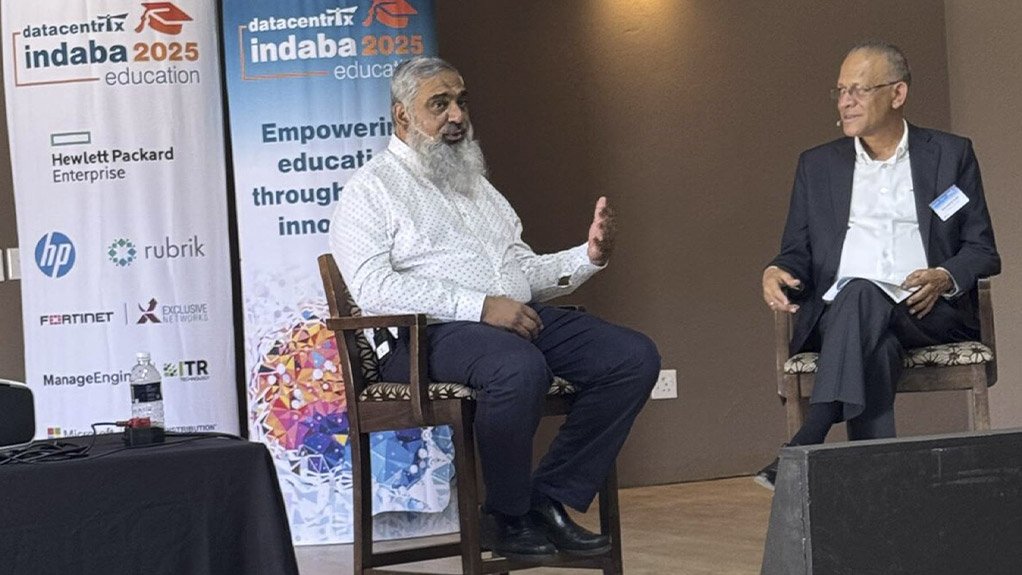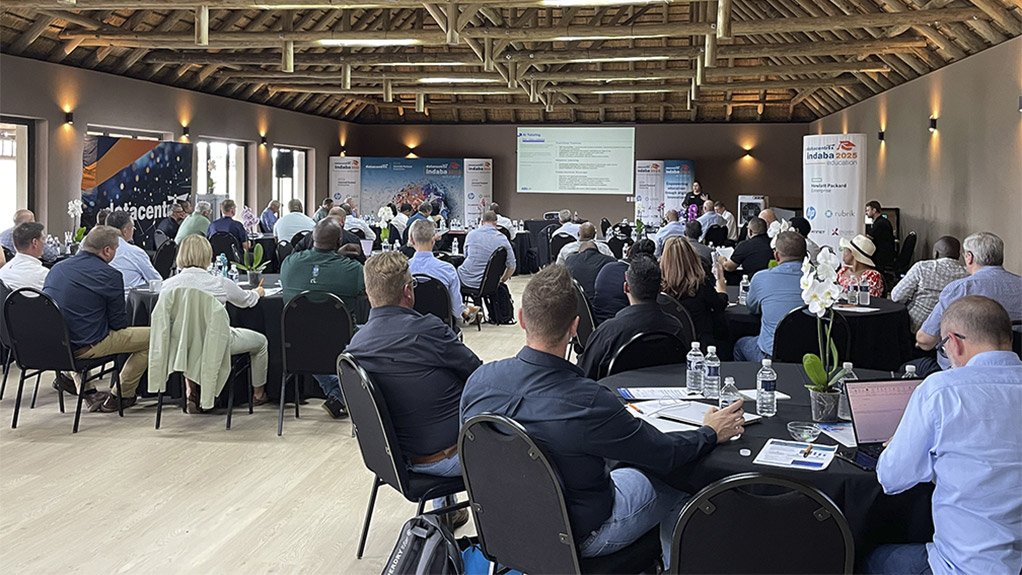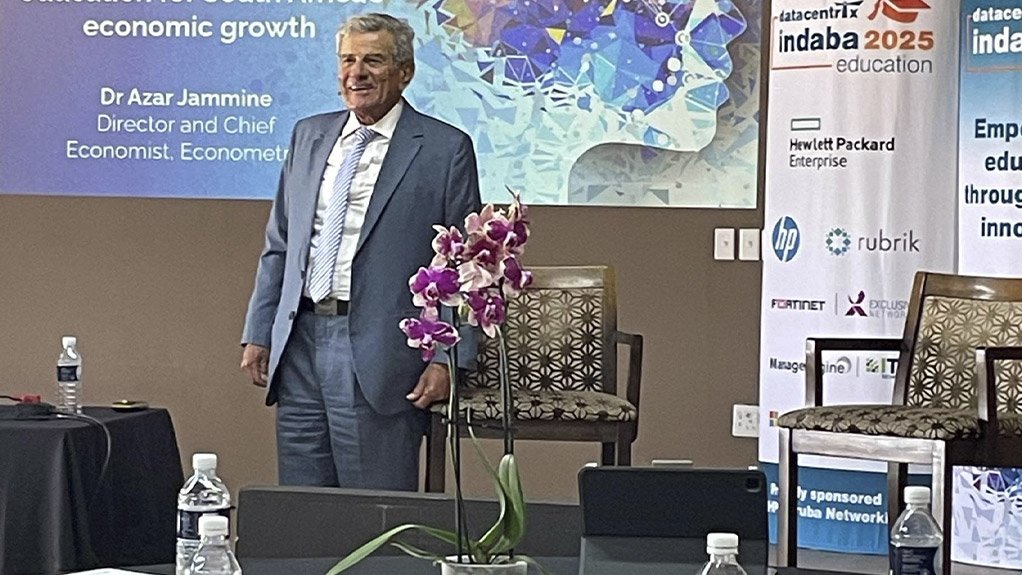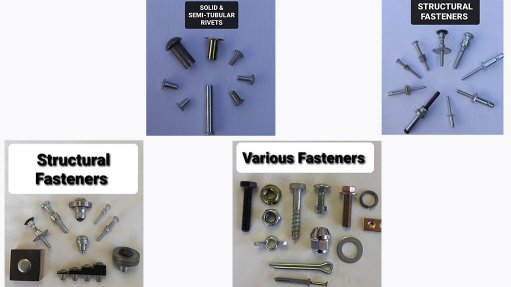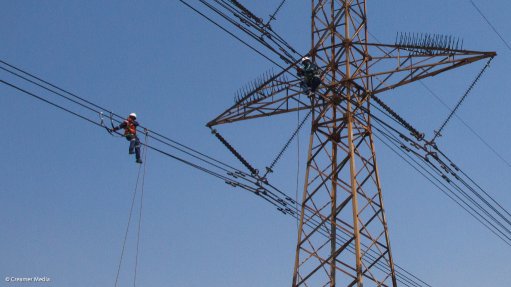AI’s role in reshaping Higher Education in South Africa
This article has been supplied and will be available for a limited time only on this website.
By understanding the implications of artificial intelligence (AI) on Higher Education, South Africa will be in a stronger position to take advantage of the potential benefits of the technology while minimising its risks and negative consequences. This was the opinion of both Dr. Azar Jammine, Director and Chief Economist, Econometrix, and Professor Andrew Crouch, Vice-Chancellor and Principal at Sol Plaatje University (SPU), who were speakers at the recent Datacentrix Education Indaba.
The event was proudly sponsored by Platinum Sponsor, Hewlett Packard Enterprise, including HPE Aruba Networking; Gold Sponsors including Fortinet/Exclusive Networks, HP Inc, ManageEngine/ITR Technology and Rubrik; and Display Sponsor, Accord Business Group (ABG). Held at Zebula Golf Estate and Spa in Limpopo, the focus of the Datacentrix event was on how harnessing technology can help South Africa’s Higher Education institutions to address critical challenges and priorities, stay ahead of global innovation, and pave the way to a sustainable future.
Key discussions revolved around AI, digital transformation, infrastructure challenges and the broader economic implications for South Africa.
Technology as a disruptor in Higher Education
Professor Crouch and Datacentrix Group CEO, Ahmed Mahomed, opened the session by sharing insights on the rapid integration of technology in education, using SPU’s initiative to equip 7,000 students with notebooks as an example. Crouch emphasised the increasing role of AI, likening it to the disruptive impact of Covid-19. The pandemic forced institutions to fast-track digital strategies, and while this came at a cost, it also led to significant advancements in remote learning and digital readiness, he explained.
Crouch and Mahomed outlined key challenges in higher education, including the following:
· Security and budget constraints: The high cost of maintaining state-of-the-art infrastructure while keeping up with technological advancements.
· Skills scarcity: A shortage of high-level technical skills required for digital transformation.
· Digital literacy gaps: While students are assumed to be digitally savvy, universities must invest in training both students and faculty to ensure effective use of digital platforms.
· Community expectations: Universities are increasingly expected to contribute to local community development through knowledge-sharing and technological support.
Crouch then highlighted SPU’s shift towards a delocalised university model, which leverages technology to deliver education across multiple learning centres – when and where it is needed – such as those planned by the university for Upington and other areas.
AI’s role in shaping education
One of the pivotal discussion points at the Datacentrix Indaba was that AI presents both opportunities and challenges for the education sector. On the positive side, it enables the automation of administrative tasks, adaptive learning through intelligent tutoring systems, and AI-driven career services. In addition, AI-powered student counselling and data-driven decision making can significantly improve student success rates.
However, ethical considerations remain a critical concern. Professor Crouch urged caution, stressing the importance of ensuring that AI developments align with human values and social good.
“We are so consumed with the advantages to be extracted, but should tread with caution, reflect, and ensure that as human beings, we act in a humane way,” he noted. “This means making choices that support humanity, ensuring that the right steps are in place in terms of training and connectivity, thereby enabling South Africa to take quantum leaps through broader access to technology. Then, the sky will truly be the limit.”
The broader economic landscape and its impact on education
In his keynote address, Dr. Jammine provided a fiscal overview, highlighting South Africa’s slow economic growth compared to global trends. He highlighted the fact that declining infrastructure investment has affected Higher Education funding, influenced by a 50 to 60 percent drop in construction activity between 2015 and 2023, coupled with reduced investment in high-tech sectors.
He also explained that there is currently a skills mismatch in South Africa, withunemployment rates remaining high at 32.9 percent in 2024, and many graduates struggling to find jobs due to a lack of STEM-related qualifications.
Observing that AI is expected to displace 92 million jobs globally by 2030, but on the other hand also create 170 million new positions, Jammine added that the challenge here for South Africa is to ensure that its education system aligns with future job demands.
The future of AI and Higher Education
According to Jammine, AI literacy and digital adaptation are critical for future graduates. In fact, the World Economic Forum’s Future of Jobs survey for 2024 points out that the demand for abilities like analytical thinking, resilience and adaptability will outweigh technical skills alone, he said, stating that AI’s ability to provide personalised learning, automate grading and enhance accessibility can be used to improve education outcomes.
However, concerns over issues such as job displacement, data privacy, technology dependence and the depersonalisation of education must be addressed. Institutions must prepare for AI integration in a way that enhances learning without diminishing the human element, he said.
Jammine’s final statement was that, by understanding the implications of AI on Higher Education, South Africa can work to harness the potential benefits of AI, while, at the same time, minimising its risks and negative consequences.
Comments
Press Office
Announcements
What's On
Subscribe to improve your user experience...
Option 1 (equivalent of R125 a month):
Receive a weekly copy of Creamer Media's Engineering News & Mining Weekly magazine
(print copy for those in South Africa and e-magazine for those outside of South Africa)
Receive daily email newsletters
Access to full search results
Access archive of magazine back copies
Access to Projects in Progress
Access to ONE Research Report of your choice in PDF format
Option 2 (equivalent of R375 a month):
All benefits from Option 1
PLUS
Access to Creamer Media's Research Channel Africa for ALL Research Reports, in PDF format, on various industrial and mining sectors
including Electricity; Water; Energy Transition; Hydrogen; Roads, Rail and Ports; Coal; Gold; Platinum; Battery Metals; etc.
Already a subscriber?
Forgotten your password?
Receive weekly copy of Creamer Media's Engineering News & Mining Weekly magazine (print copy for those in South Africa and e-magazine for those outside of South Africa)
➕
Recieve daily email newsletters
➕
Access to full search results
➕
Access archive of magazine back copies
➕
Access to Projects in Progress
➕
Access to ONE Research Report of your choice in PDF format
RESEARCH CHANNEL AFRICA
R4500 (equivalent of R375 a month)
SUBSCRIBEAll benefits from Option 1
➕
Access to Creamer Media's Research Channel Africa for ALL Research Reports on various industrial and mining sectors, in PDF format, including on:
Electricity
➕
Water
➕
Energy Transition
➕
Hydrogen
➕
Roads, Rail and Ports
➕
Coal
➕
Gold
➕
Platinum
➕
Battery Metals
➕
etc.
Receive all benefits from Option 1 or Option 2 delivered to numerous people at your company
➕
Multiple User names and Passwords for simultaneous log-ins
➕
Intranet integration access to all in your organisation



